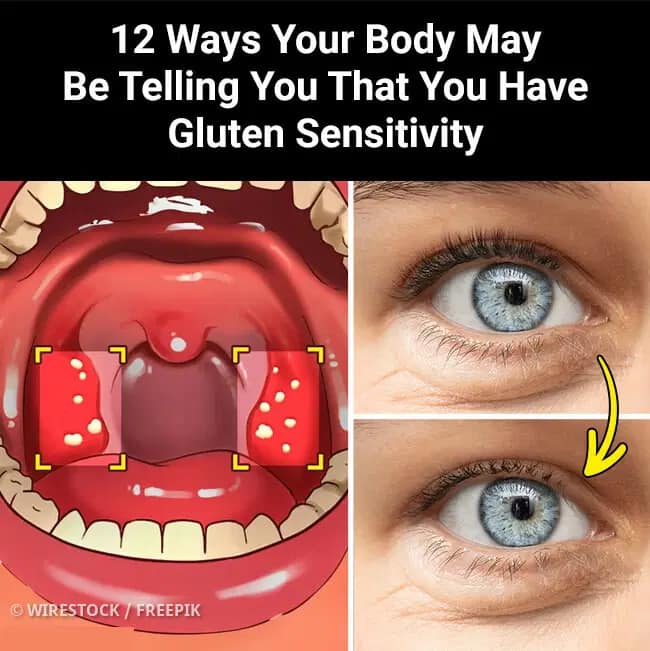For many, gluten—a protein found in wheat, rye, and barley—is a harmless part of the diet. But for others, gluten can quietly wreak havoc on their health. Often, the signs of gluten sensitivity or intolerance are subtle and easily overlooked, potentially leading to more serious long-term health complications. Recognizing these signs is essential to maintaining overall well-being. Here are 12 ways your body might be telling you it has trouble processing gluten.

1. Eyelash Loss
Gluten intolerance, especially in cases like celiac disease, can lead to hair loss, including eyelashes. Damage to the small intestine caused by gluten hinders nutrient absorption, leading to deficiencies in vital nutrients like iron, zinc, and biotin—all necessary for healthy hair growth. This nutrient deficiency often results in thinning hair or complete eyelash loss.
2. Digestive Troubles
Gluten sensitivity often manifests through digestive issues such as bloating, nausea, diarrhea, abdominal pain, and sometimes constipation. These symptoms are frequently misdiagnosed as irritable bowel syndrome (IBS), delaying effective treatment. With IBS affecting 10-15% of the global population, many people suffering from gluten intolerance go undiagnosed, prolonging their discomfort.
3. Unexplained Weight Changes
Abrupt weight gain or loss can be a sign of gluten intolerance. These fluctuations are often due to underlying inflammation and disrupted metabolic processes. When accompanied by digestive issues or nutrient deficiencies, such as low iron or vitamin levels, unexpected weight changes might signal gluten sensitivity.
4. Hormonal Imbalances
Gluten intolerance is linked to hormonal disruptions, which can cause irregular menstrual cycles, premenstrual syndrome (PMS), and changes in sleep patterns. These imbalances often become more pronounced during puberty, pregnancy, or menopause. Women are particularly susceptible, highlighting a potential gender-specific impact of gluten on hormones.
5. Neurological Symptoms
Consuming gluten can lead to heightened inflammation and increased intestinal permeability, triggering neurological symptoms like brain fog, difficulty concentrating, anxiety, depression, and fatigue. Many individuals with gluten sensitivity also experience migraines, with headaches typically occurring 30-60 minutes after consuming gluten-containing foods.
6. Skin and Nail Problems
Skin conditions such as keratosis pilaris (bumpy skin) and dermatitis herpetiformis (itchy, inflamed rashes) are strongly associated with gluten intolerance. These rashes often appear on the hands, torso, elbows, or hairline. Gluten sensitivity can also weaken nails, making them brittle, and contribute to eczema-like skin irritations caused by systemic inflammation.
7. Attention Deficit Hyperactivity Disorder (ADHD)
Emerging research suggests a link between gluten sensitivity and ADHD, a condition characterized by impulsivity, a short attention span, and challenges with self-regulation. For individuals with gluten intolerance, a gluten-free diet may help reduce some ADHD symptoms, offering a dietary intervention that could improve focus and daily functioning.
8. Dental Issues
Gluten sensitivity affects calcium absorption, leading to dental problems such as tooth decay, enamel erosion, and frequent mouth ulcers. Persistent oral health issues despite good hygiene might indicate an underlying gluten intolerance, warranting dietary evaluation and changes.
9. Iron Deficiency Anemia
Celiac disease, an autoimmune response to gluten, often results in iron deficiency anemia due to impaired iron absorption. Symptoms include fatigue, shortness of breath, pale skin, headaches, and joint pain. Even with a diet rich in iron, people with gluten sensitivity may struggle to maintain healthy iron levels without removing gluten from their meals.
10. Autoimmune Disorders
Gluten intolerance significantly increases the risk of developing autoimmune diseases. Conditions such as Crohn’s disease, rheumatoid arthritis, lupus, and type 1 diabetes often coexist with celiac disease. The immune system’s overreaction to gluten can trigger widespread inflammation and damage, highlighting the broader implications of gluten intolerance on overall immune health.
11. Tonsil Stones
Though not widely studied, some individuals with gluten sensitivity report frequent tonsil stones—collections of debris and bacteria in the tonsils. Many patients observe a significant reduction or complete elimination of tonsil stones after adopting a gluten-free diet, suggesting a potential connection worth exploring further.
12. Hair Thinning or Loss
Hair loss, particularly in those with celiac disease, is another indicator of gluten sensitivity. This often results from malabsorption of key nutrients like biotin, iron, and zinc due to intestinal damage caused by gluten. In some cases, the autoimmune response triggered by gluten targets hair follicles, leading to patchy hair loss or conditions like alopecia areata. A gluten-free diet can significantly improve hair health for those affected.
Addressing Gluten Sensitivity
If you suspect gluten sensitivity, take the following steps to manage your symptoms effectively:
1. Get Tested
Consult your doctor for a blood test to detect antibodies commonly associated with celiac disease. To ensure accurate results, maintain a gluten-containing diet before testing.
2. Eliminate Gluten from Your Diet
Avoid foods containing gluten, such as:
- Wheat
- Rye
- Barley
- Semolina
- Bulgur
Read food labels carefully and choose products labeled “gluten-free.” Dining out may require extra vigilance, so don’t hesitate to ask about ingredients and preparation methods.
Take Control of Your Health
Recognizing the signs of gluten sensitivity can prevent long-term complications and significantly improve your quality of life. By addressing symptoms early and making dietary adjustments, you can alleviate discomfort and reduce the risk of further health issues. While transitioning to a gluten-free lifestyle may seem challenging, the benefits for your health and well-being make it well worth the effort.





